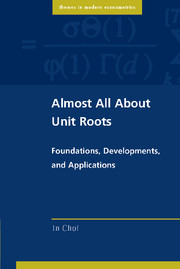Book contents
- Frontmatter
- Dedication
- Contents
- Foreword
- Preface
- Abbreviations and Notation
- 1 Introduction
- 2 Inference on Unit Roots: Basic Methods
- 3 Unit Root Tests under Various Model Specifications
- 4 Alternative Approaches to Inference on Unit Roots
- 5 Other Issues Related to Unit Roots
- 6 Seasonal Unit Roots
- 7 Panel Unit Roots
- Epilogue
- References
- Index
2 - Inference on Unit Roots: Basic Methods
Published online by Cambridge University Press: 05 May 2015
- Frontmatter
- Dedication
- Contents
- Foreword
- Preface
- Abbreviations and Notation
- 1 Introduction
- 2 Inference on Unit Roots: Basic Methods
- 3 Unit Root Tests under Various Model Specifications
- 4 Alternative Approaches to Inference on Unit Roots
- 5 Other Issues Related to Unit Roots
- 6 Seasonal Unit Roots
- 7 Panel Unit Roots
- Epilogue
- References
- Index
Summary
Introduction
This chapter introduces basic methods for inference on unit roots. Naturally, it starts with the AR(1) model with a unit root or a near unit root, because this model is the cornerstone for research on unit roots. Studies in the AR(1) model were published as early as the 1940s (see, for example, Anderson, 1942; Koopmans, 1942; and Mann and Wald, 1943), but it was White (1958) who first studied the AR(1) model with a unit root. It is quite remarkable to observe how many papers on the AR(1) model have been published since then. Even today, it is easy to find papers on the AR(1) model in journals related to econometrics and statistics.
After discussing asymptotic results for the AR model, this chapter introduces Dickey and Fuller's (1979) test for a unit root and its extensions. Though there have been many unit root tests in the literature, Dickey and Fuller's test and some of its variants are still the most used in practice. However, because this test and its extensions are perceived to have low power, efforts have been made to develop unit root tests that have higher power. Research results of these efforts are introduced next. Because AR models may have other types of unit roots than unity, asymptotic theory for the AR models with negative and complex unit roots is also introduced in this chapter. It concludes with a summary and further remarks.
Asymptotic Distributions of the OLS Estimator for Nonstationary AR Models
This section presents basic asymptotic distribution theory of the OLS estimator for AR models with a positive unit root or roots near to one. Distribution theory for the AR(1) models with a unit root is discussed first, and then the discussion is extended to the AR(p) models. Then the section introduces asymptotic theory for the AR(1) models with roots near to one. Distribution theory for the AR(1) model with a unit root and fractionally integrated errors are presented last.
- Type
- Chapter
- Information
- Almost All about Unit RootsFoundations, Developments, and Applications, pp. 16 - 57Publisher: Cambridge University PressPrint publication year: 2015

